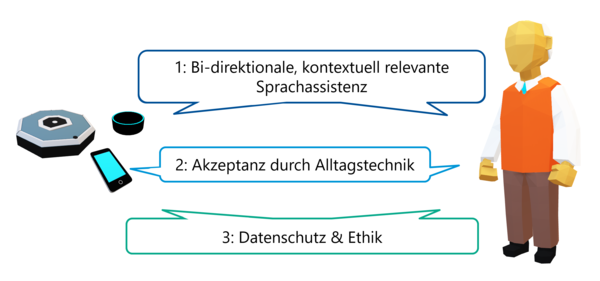Using everyday low-cost robot sensors and smart speech recognition in assistance services for elderly people
The Smart Companion 1 project laid the groundwork for the Smart Companion 2 project. Smart Companion 2 implements the concept with an improved design, robustness, user-centered development and evaluates it with 6 months of field testing. Details of the refined system are provided in SC2.
Background and Project Content
With increasing life expectancy, more older people need support in their daily lives to maintain autonomy and independence. To help achieve this, existing smart technologies in households can be put to use. While connected devices such as voice assistants and (household) robotics often pose challenges for older generations, this very group can benefit greatly from their potential.
One of the most widely accepted robotic systems so far has been the vacuum-cleaning robot – in 2016, these accounted for around 80% of all household robots in Austria. Since they provide more freedom in everyday life, their acceptance among older adults is particularly high. In this project and its follow-up, we investigate how well vacuum-cleaning robots can serve as assistance systems.
Method and Aims
Autonomous low-cost robot sensor technology is combined with smart voice interaction for assistance systems. The system actively addresses users with appropriate questions and information on selected social and health topics. For example, the Smart Companion asks seniors if everything is okay and triggers an alarm if necessary when a suspected fall is detected – based on an apartment floor plan created by the vacuum robot.
The Smart Companion project sets three objectives:
1.Implementation and evaluation of the Smart Companion Demonstrator
Together with the project partner Robert Bosch AG, the solution and software architecture will be optimised in terms of economic feasibility. Through a user centered design approach, the scenario is iteratively implemented, engaging test users throughout the whole process and with the expertise of the Academy for Aging Research at “Haus der Barmherzigkeit”. The goal is to demonstrate at least 5 scenarios classified as (very) useful according to the Technology Acceptance Model.
2. Additional validation of the demonstrator with focus groups
Using everyday technology, the availability, costs and acceptance of the system can be reliably assessed. The demonstrator is additionally validated with 3 focus groups (senior citizens, social and care services, relatives). The validation is based on usefulness to lay the basis for follow-up projects for the implementation of such systems together with economic partners.
3. Privacy and Ethics
With the increasing penetration of our living and living environment by intelligent technical systems, various ethical and data protection issues arise. In order to take these issues into account, there is an ethics board from the outset. A guide is created, with the ultimate goal of providing an opportunity for self-informed decisions.
Funding
Downloads
- Akademie der Altersforschung am Haus der Barmherzigkeit
- Robert Bosch AG



